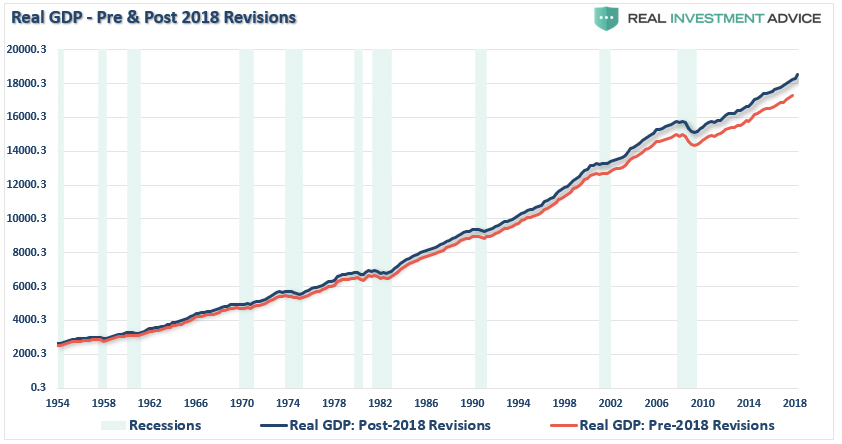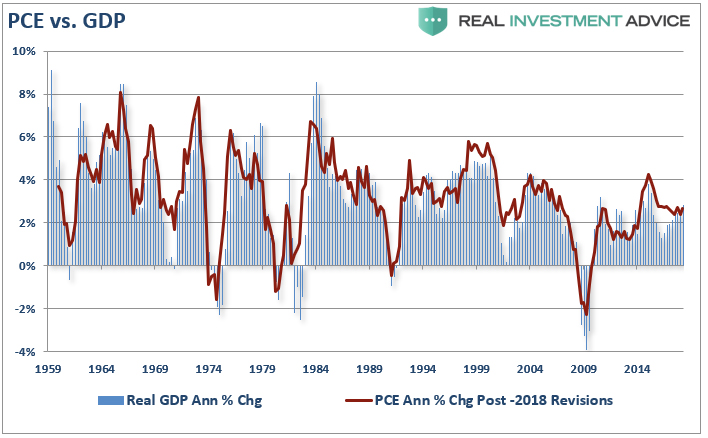Mathematical Adjustments Don’t Change Reality
Lance Roberts
 Yesterday, I discussed the mathematical adjustment to the GDP calculation that added $1 trillion to economic growth. To wit: Yesterday, I discussed the mathematical adjustment to the GDP calculation that added $1 trillion to economic growth. To wit:
“Where did a bulk of the change come from? A change in the calculation of “real” GDP from using 2009 dollars to 2012 dollars which boosted growth strictly from a lower rate of inflation. As noted by the BEA:
“For 2012-2017, the average rate of change in the prices paid by U.S. residents, as measured by the gross domestic purchasers’ price index,was 1.2 percent, 0.1 percentage point lower than in the previously published estimates.”
Of course, when you ask the average household about “real inflation,” in terms of healthcare costs, insurance, food, energy, etc., they are likely to give you quite an earful that the cost of living is substantially higher than 1.2%. Nonetheless, the chart below shows “real” GDP both pre- and post-2018 revisions.”

Importantly, the entire revision is almost entirely due to a change in the inflation rate. On a nominal basis, there was virtually no real change at all. In other words, stronger economic growth came from a mathematical adjustment rather than increases in actual economic activity.
The change to a lower inflation rate also boosted disposable incomes and personal consumption expenditures which also boosted the savings rate. However, what doesn’t change is economic reality. The chart below shows what we call “real DPI” or rather it is disposable incomes (which is gross income minus taxes) less spending. What we have left over after paying our bills, healthcare costs, food, tuition, etc. is what is really disposable for spending on other “stuff” or “saving.”

Despite the adjusted bump in savings, consumer activity continues to remain weak. Given that roughly 70% of the economic calculation comes from personal consumption, watching consumer activity is a good leading indicator of where the economy is headed next. PCE figures also suggest the recent bump in economic growth is likely transitory. Looking back historically, GDP tends to follow PCE and not vice-versa.

More importantly, weaker economic growth rates will also be met with much tougher year-over-year comparisons on corporate earnings which likely further hamper equity returns in the near term.
As we summed up yesterday:
“As an investor, it is important to remember that in the end corporate earnings and profits are a function of the economy and not the other way around. Historically, GDP growth and revenues have grown at roughly equivalent rates.
Forget the optimism surrounding “’Trumpenomics’ and focus on longer-term economic trends which have been declining for the past 30+ years. The economic trend is a function of a growing burden of debt, increasing demographic headwinds and, very importantly, declining productivity growth. I see little to make me believe these are changing in a meaningful way.”
Changing the math doesn’t change reality.

Finally, investing that makes sense. Lance Roberts has a unique ability to bring the complex world of politics, economics, investing and personal financial wealth building to you in simple, easy and informative way. Rather than just regurgitating the news of the day, Lance looks at the “raw data” to bring a unique and “unspun” perspective to the conversation. Lance deep understanding of fundamental, technical and economic perspectives, combined with his unique focus, helps listeners, readers and investors understand how it impacts their family, their money and their life.
Having been in the investing world for more than 25 years, from private banking and investment management to private and venture capital, Lance has pretty much "been there and done that" at one point or another. His common sense approach, clear explanations and “real world” experience has appealed to audiences for almost two decades.
After building an extremely successful Registered Investment Advisory firm in Houston, Texas with almost $700 million in AUM, Lance is back at it building the next generation wealth advisory firm incorporating new tech with old money.
Lance is the Chief Editor of the Real Investment Report, a weekly subscriber based-newsletter that is distributed globally. He is also writes a daily blog which is read by tens of thousands from individuals to professionals, and his opinions are frequently sought after by major media sources.
Lance’s investment strategies and knowledge have been featured on CNBC, Fox Business News, Business News Network and Fox News. He has been quoted by a litany of publications from the Wall Street Journal, Reuters, Bloomberg, The New York Times, The Washington Post all the way to TheStreet.com. His writings and research have also been featured on several of the nation's biggest financial blog sites such as the Pragmatic Capitalist, Credit Writedowns, The Daily Beast, Zero Hedge and Seeking Alpha.
realinvestmentadvice.com
|




